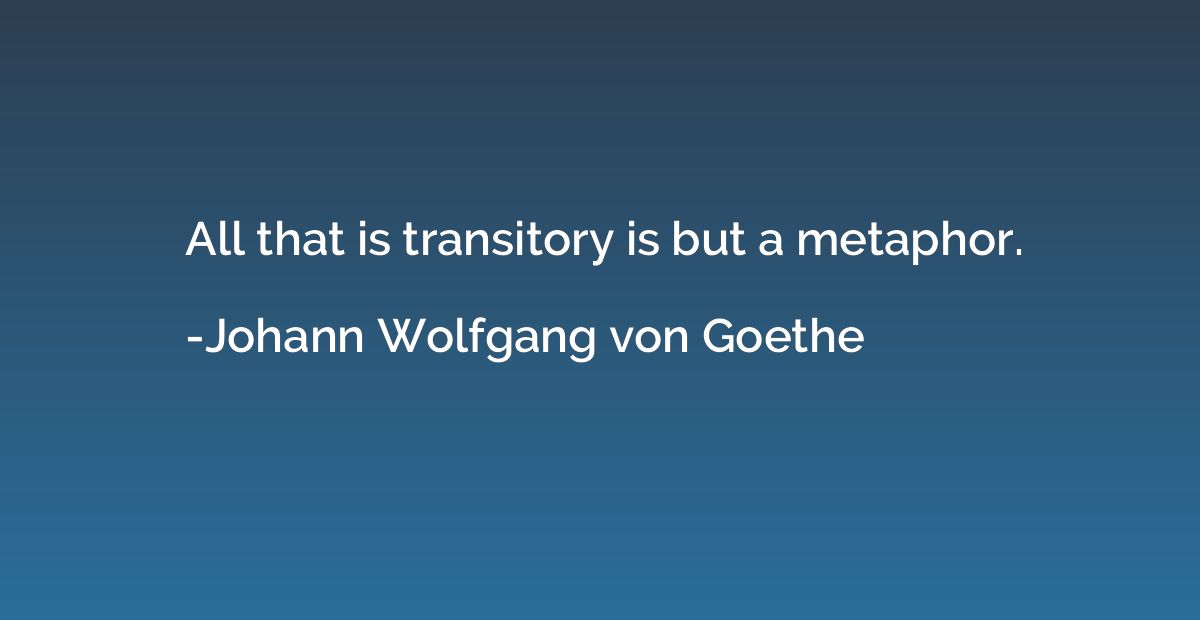“All that is transitory is but a metaphor” is a powerful phrase that resonates deeply with those who seek meaning in life's fleeting moments. This profound statement, originally expressed by Johann Wolfgang von Goethe, invites us to explore the transient nature of existence and how it relates to the human experience. It challenges us to reflect on what truly matters amidst the ever-changing world around us.
Goethe’s timeless words have inspired countless thinkers, artists, and philosophers to delve into the essence of impermanence and its metaphorical implications. This article aims to provide a comprehensive understanding of this concept while offering practical insights into how it can shape our perspectives and enrich our lives.
By examining the historical context, philosophical interpretations, and contemporary applications of this idea, we will uncover the layers of meaning behind “all that is transitory is but a metaphor.” Whether you're a student of philosophy, an artist seeking inspiration, or simply someone curious about life's deeper truths, this article will guide you through an enriching journey.
- How Old Is Bryce James
- Beau Of The Fifth Column
- Us Department Of Homeland Security
- Dna Confidential Host Carla Foley
- Opa Opa Brewing Co
Table of Contents
- The Origin of the Phrase
- Philosophical Underpinnings
- Understanding Transience
- The Role of Metaphors in Life
- Impact on Art and Literature
- Scientific Perspectives on Transience
- Psychological Insights into Impermanence
- Spiritual Interpretations
- Practical Applications in Daily Life
- The Future of Transience and Metaphor
The Origin of the Phrase
The phrase “all that is transitory is but a metaphor” originates from the renowned German poet, novelist, and philosopher Johann Wolfgang von Goethe. In his work “Faust,” Goethe explores themes of human ambition, desire, and the pursuit of knowledge. This particular line comes from the final scene of the epic poem, where it serves as a reflection on the fleeting nature of earthly existence.
Goethe’s use of metaphor highlights the idea that everything we perceive as permanent is, in reality, part of a larger symbolic framework. This concept challenges readers to look beyond surface-level appearances and consider the deeper meanings hidden within life’s transient phenomena.
Key takeaway: Goethe’s words remind us that life’s impermanence is not something to fear but rather an opportunity to embrace deeper truths.
- Magic Johnson Career Stats
- Blue Hills Ski Area
- Jr Smith Scared To Take Layup In Nba Finals
- Infrastructure Forum Pembroke Ma September 12th
- Stage Manager Come From Away
Goethe's Influence on Modern Thought
Goethe’s influence extends far beyond literature. His ideas have shaped modern philosophy, psychology, and even science. By emphasizing the interconnectedness of all things, he laid the groundwork for holistic thinking that continues to inspire contemporary scholars.
Philosophical Underpinnings
Philosophers throughout history have grappled with the concept of transience and its implications. From Heraclitus’ notion of constant change to Buddhist teachings on impermanence, the idea that nothing remains static is a recurring theme in philosophical discourse.
“All that is transitory is but a metaphor” aligns closely with these philosophical traditions, suggesting that our understanding of reality is shaped by the symbols and meanings we assign to transient experiences.
Important philosophers:
- Heraclitus: Emphasized the idea of constant flux.
- Buddha: Taught the principle of impermanence (anicca).
- Nietzsche: Explored the concept of eternal recurrence.
Connections to Existentialism
Existentialist thinkers like Jean-Paul Sartre and Albert Camus also explored the tension between permanence and impermanence. They argued that human existence is inherently transient, yet we must find meaning in this transience.
Understanding Transience
Transience refers to the quality of being temporary or short-lived. It is a fundamental aspect of existence that affects everything from natural phenomena to human emotions. Understanding transience allows us to appreciate life’s beauty while acknowledging its fragility.
In the context of “all that is transitory is but a metaphor,” transience becomes a lens through which we view the world. It encourages us to see beyond the immediate and recognize the symbolic significance of fleeting moments.
Examples of transience:
- The changing seasons.
- Human relationships.
- Technological advancements.
The Role of Metaphors in Life
Metaphors are powerful tools for making sense of complex ideas. They allow us to bridge the gap between abstract concepts and concrete experiences. In the context of Goethe’s phrase, metaphors serve as a way to interpret the transitory nature of life.
By viewing life’s impermanence through a metaphorical lens, we can gain new perspectives and insights. For example, the rising and setting of the sun can be seen as a metaphor for the cyclical nature of life itself.
Why metaphors matter:
- They simplify complex ideas.
- They evoke emotional responses.
- They inspire creativity and innovation.
Impact on Art and Literature
Art and literature have long been mediums for exploring the transient nature of existence. Painters, poets, and musicians often use their work to capture fleeting moments and convey deeper truths. The idea that “all that is transitory is but a metaphor” has inspired countless artists to create works that reflect this profound insight.
Famous works inspired by transience:
- Van Gogh’s “Starry Night.”
- Shakespeare’s sonnets on time and beauty.
- Photographs capturing fleeting moments.
Contemporary Artists
Modern artists continue to explore themes of transience and metaphor in innovative ways. Through digital media, performance art, and experimental techniques, they push the boundaries of traditional artistic expression.
Scientific Perspectives on Transience
Science provides valuable insights into the transient nature of the universe. From quantum mechanics to evolutionary biology, scientific discoveries reveal the constant change and transformation that underlie all forms of existence.
Key scientific concepts:
- Entropy: The measure of disorder in a system.
- Evolution: The process of change over time.
- Relativity: The interdependence of space and time.
These scientific principles align with Goethe’s idea that everything is interconnected and subject to change.
Psychological Insights into Impermanence
Psychologists have long recognized the impact of impermanence on human behavior and mental health. Accepting transience can lead to greater resilience, emotional well-being, and a deeper appreciation for life’s beauty.
Psychological benefits of embracing impermanence:
- Increased mindfulness.
- Reduced anxiety about the future.
- Improved relationships.
Spiritual Interpretations
Many spiritual traditions emphasize the importance of embracing impermanence as a path to enlightenment. Whether through meditation, prayer, or ritual, spiritual practices often focus on cultivating awareness of life’s transitory nature.
In the context of “all that is transitory is but a metaphor,” spirituality offers a framework for understanding the symbolic significance of earthly experiences.
Spiritual practices to try:
- Mindfulness meditation.
- Gratitude journaling.
- Connecting with nature.
Practical Applications in Daily Life
Understanding the concept of transience and its metaphorical implications can have practical applications in everyday life. By embracing change and finding meaning in fleeting moments, we can cultivate a more fulfilling and purposeful existence.
Practical tips:
- Practice gratitude for the present moment.
- Engage in creative activities to express your thoughts.
- Build meaningful relationships with others.
Overcoming Challenges
Life’s challenges often stem from our resistance to change. By accepting transience as a natural part of existence, we can approach difficulties with greater resilience and adaptability.
The Future of Transience and Metaphor
As we move forward into an increasingly interconnected and rapidly changing world, the concept of transience and its metaphorical implications will only become more relevant. By embracing this idea, we can navigate the complexities of modern life with greater clarity and purpose.
Future generations will likely continue to explore the intersection of science, art, and spirituality in understanding the transient nature of existence. This ongoing dialogue will shape how we view ourselves and our place in the universe.
Conclusion
In conclusion, “all that is transitory is but a metaphor” offers a profound perspective on life’s impermanence and the symbolic meanings we assign to fleeting experiences. By exploring its philosophical, scientific, and spiritual dimensions, we gain valuable insights into the human condition.
We invite you to reflect on these ideas and share your thoughts in the comments below. Additionally, consider exploring related articles on our site for further inspiration and guidance. Together, let’s embrace the beauty of transience and the power of metaphor in shaping our understanding of the world.
References:
- Goethe, J. W. von. (1832). Faust. Retrieved from [source]
- Heraclitus. (500 BCE). Fragments. Retrieved from [source]
- Nietzsche, F. (1882). The Gay Science. Retrieved from [source]


Detail Author:
- Name : Dr. Edwardo Deckow Sr.
- Username : vada18
- Email : zschroeder@fritsch.org
- Birthdate : 2002-06-13
- Address : 29359 Kemmer Forges New Antoninaview, TX 67477-7819
- Phone : 1-307-227-9697
- Company : Harvey, Smitham and Jacobson
- Job : Urban Planner
- Bio : Error officia vitae quia eveniet ea. Facilis iusto nemo corrupti et qui. Consequatur voluptas praesentium quod fugit. Et dolore dolore aut dolorem.
Socials
twitter:
- url : https://twitter.com/jovany.bogan
- username : jovany.bogan
- bio : Earum officiis modi assumenda perspiciatis sunt sequi. Sit nobis sit sed molestiae aut. Omnis quia quidem et maiores ut iste.
- followers : 6708
- following : 2235
instagram:
- url : https://instagram.com/jovany_dev
- username : jovany_dev
- bio : Commodi repellat facilis vel ipsum unde. Et quo et incidunt ipsa itaque.
- followers : 5410
- following : 1605